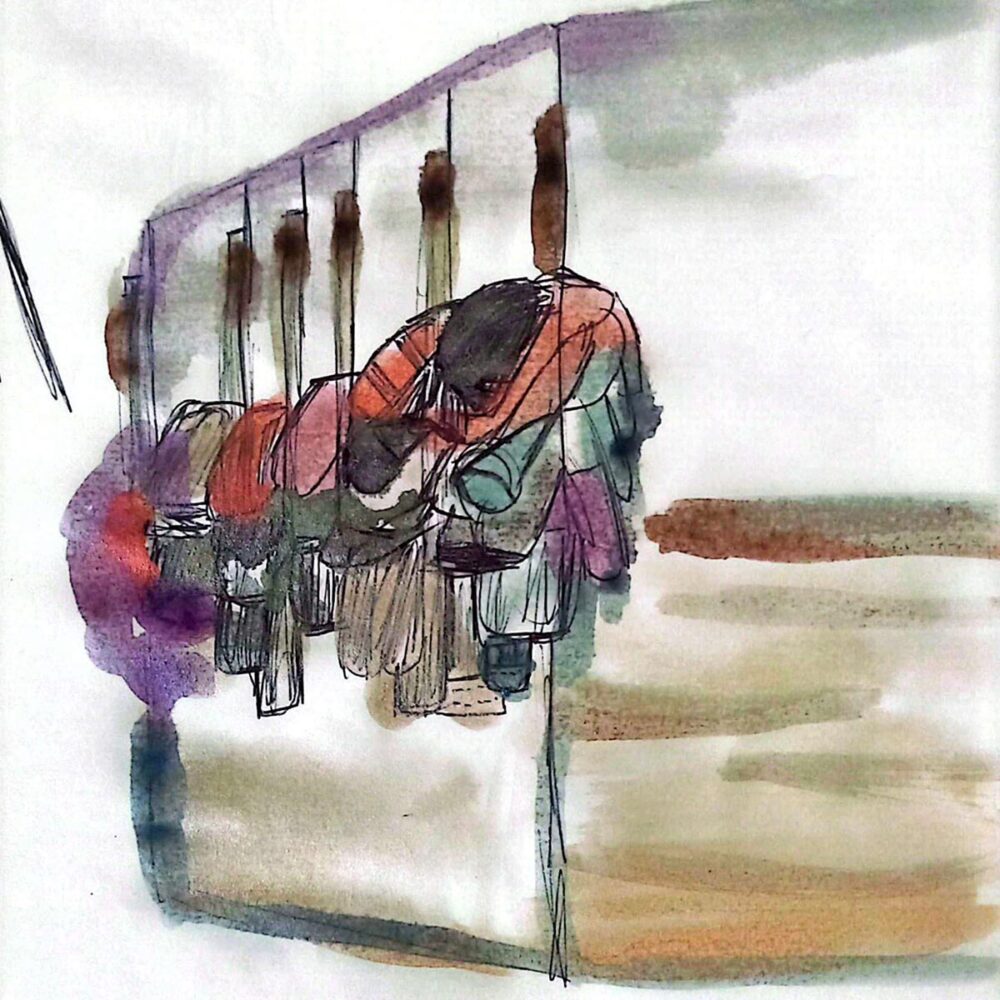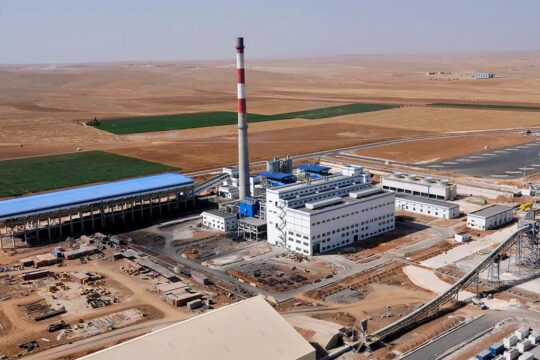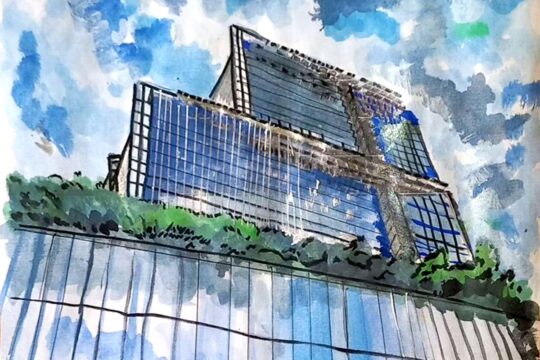Sciences Po Paris
المقال متوفر باللغة العربية / This article is also available in Arabic on the Syrian Justice and Accountability Centre (SJAC) website.
At 2 p.m. on Tuesday November 4, 2025, an extraordinary anti-terrorism trial began on the second floor of a Paris Criminal Court. With cameras clicking and microphones at the ready, journalists crowded into the wings of courtroom 2.01. Surrounding them was a large police presence, reflecting the importance of the event: the start of the trial of French cement manufacturer Lafarge and eight of its former executives for financing terrorism and violating international financial sanctions.
In 2010, the Jalabiya factory in north-eastern Syria began cement production. A few months later, uprisings broke out, heralding armed conflict. Expatriate employees were evacuated, but Syrian employees were kept on the job, working in increasingly dangerous conditions. The price of securing production came to around €5 million paid to armed groups, notably Islamic State (IS). Although the events took place in Syria, Article 121-2 of the French Penal Code allows French courts to prosecute Lafarge SA as a legal entity, in its capacity as the parent company controlling 99% of its Syrian subsidiary Lafarge Cement Syria (LCS).
Unusual defendants
Inside the courtroom, the defence lawyers seem relaxed. There are many of them, occupying nearly two rows in the courtroom. Among them are leading barristers such as Solange Doumic and Jacqueline Laffont-Haïk, who have defended the likes of former French President Jacques Chirac and Parisian politicians Patrick and Isabelle Balkany. They greet each other, chat loudly and interact with the press. Their coats and jackets are piled up behind them, hanging above a dock that is empty of the accused. They occupy the space with confidence, whether this be a touch of arrogance linked to the trial or just to lighten the solemn ritual of criminal proceedings.
The dock is empty, but some of the defendants are present: a group of elderly men in suits. They are not being held in preventive detention, and they sit on red chairs. These are not the usual figures seen in trials of jihadists. There are four former senior representatives of Lafarge: Bruno Lafont (former CEO), Christian Herrault (former deputy CEO), Bruno Pescheux and Frédéric Jolibois (former directors of the Syrian subsidiary), as well as the factory’s security manager, Jacob Waerness. At their side is Jean-Marc Golberg, the company’s legal representative. Three defendants are being tried in absentia: Amro Taleb (consultant, alleged intermediary), Ahmed Ibrahim Al Jaloudi (former security manager, absent due to illness) and Hassan Firas Tlass (businessman), who is under an international arrest warrant and resides in the United Arab Emirates. After eight years of legal proceedings, these defendants are finally being called to the stand to answer the charges against them.
As the noise dies down and conversations become whispers, there is a tense atmosphere. Suddenly, silence falls and the solemnity of the place returns. All eyes are fixed on the front of the courtroom as the judges file in.
The presiding judge opens proceedings by reading the indictment. One by one, the defendants are called to the stand to state their identities. As they step forward, their discomfort is clear. They speak so softly that they can barely be heard. But as soon as an adjournment is called, their apparent discomfort seems to disappear. They stand, hands in pockets, pace the Paris courtroom and blend into the crowd, where their status as defendants seems to melt away into their usual privileged status. This reminds us of the unusual nature of this trial, where you can be charged with complicity in terrorism but appear in court as a free person.
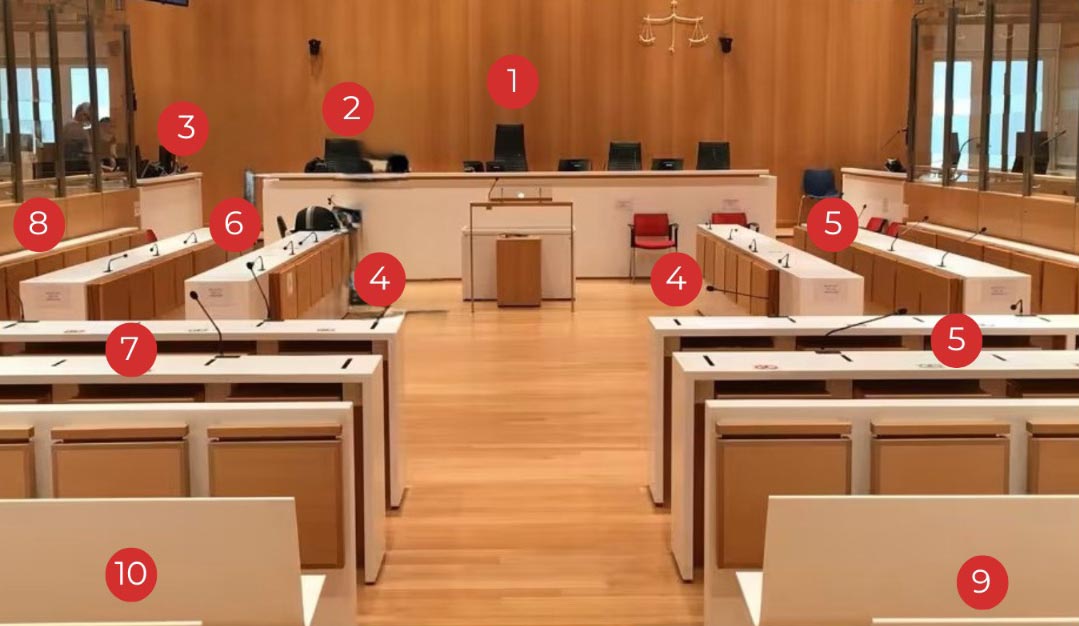
- Presiding judge: Isabelle PRÉVOST-DESPREZ
- Two assistant judges
- Prosecutors: Aurélie VALENTE (deputy anti-terrorism prosecutor), Olga MARTIN-BELLIARD (assitant anti-terrorism prosecutor)
- Accused: Bruno LAFONT, Bruno PESCHEUX, Christian HERRAULT, Frédéric JOLIBOIS, Jacob WAERNESS
- Defense lawyers: Jacqueline LAFFONT-HAIK, Quentin DE MARGERIE, Solange DOUMIC, Aurélia GRIGNON, Jean REINHART
- Civil parties' lawyers: Élise LE GALL, Joseph BREHAM, Matthieu BAGARD, Baptiste VACHON, Grégoire RIALAN, Julie FÉVRIER
- Civil parties (organisations and individuals represented)
- Interpreters
- Public
- Press
A balance of power reversal
The National Anti-Terrorism Prosecutor’s Office (PNAT), created in 2019, was born from the merger of the former anti-terrorism and crimes against humanity units of the Paris Public Prosecutor’s Office. After the Court of Cassation confirmed, in January 2024, the investigation into Lafarge for complicity in crimes against humanity – a first in French judicial history – the case was split. For so-called “pragmatic” reasons, only the anti-terrorism component is currently being tried. If a trial for crimes against humanity were to take place, it would be held before the Assize Court, with a jury, and the State would again be represented by the PNAT.
In a French courtroom, the position of the public prosecutor symbolises power relations. Prosecutors sit on the same level as judges, clearly above the defendants, in an arrangement that highlights the authority of the State. This is coupled with another form of hierarchy, namely the active role of the judge, who questions, reframes and re-launches, unlike in common law practices where the judge remains more of an arbitrator than a protagonist. However, this trial shifts the usual balance of power, as the prosecutor has been quick to point out from the start of the hearing. Unlike in other terrorism trials, it seems that here the defence has the upper hand. It submitted more than 500 pages of documents just one week before the start of the trial, causing upset for the prosecution. The defence’s almost unlimited resources contrast with the State’s more limited means. This reverse asymmetry has become a strategy in its own right, blurring the usual lines between public authorities and private actors in the judicial anti-terrorism arena.
Syrian employees excluded from the trial
Six young women sit in the front row of the civil parties’ benches on the left-hand side of the courtroom. They are pleading on behalf of French association Sherpa and German NGO European Centre for Constitutional and Human Rights (ECCHR), which have since 2016 been representing Lafarge’s Syrian employees. However, the Syrian employees are conspicuously absent from this trial. According to Elise Le Gall, one of their lawyers, they suffered direct and personal harm as a result of the financial agreements negotiated between Lafarge and the terrorist groups that controlled their movements. But the Court of Cassation in a 2021 ruling interpreted the financing of terrorism as an act that cannot create direct victims. This excludes them from being civil parties in this trial.
Employees will therefore not be entitled to claim compensation. At the hearing, their lawyers denounced this as a violation of the principle of equality, due to unequal access to justice. “Victims must be given back the right to exist,” they argued. Refusing to admit the victims’ case “is tantamount to considering that a terrorist act can exist without victims”, according to the lawyers.
In an unprecedented move, the civil parties therefore “regretfully” requested three priority preliminary rulings on constitutionality (QPCs). QPCs are a specific feature of French preliminary procedure law that allow a party to challenge the constitutionality of a legislative provision applicable to the case. The issue is then examined by the judges, who decide whether to refer it to the Constitutional Council. If a QPC is referred, the proceedings could be prolonged even though, paradoxically, the civil parties have been waiting a very long time for this trial. The civil parties’ lawyers say they are nevertheless prepared to take this risk if it means victims can receive the compensation they believe they are entitled to.
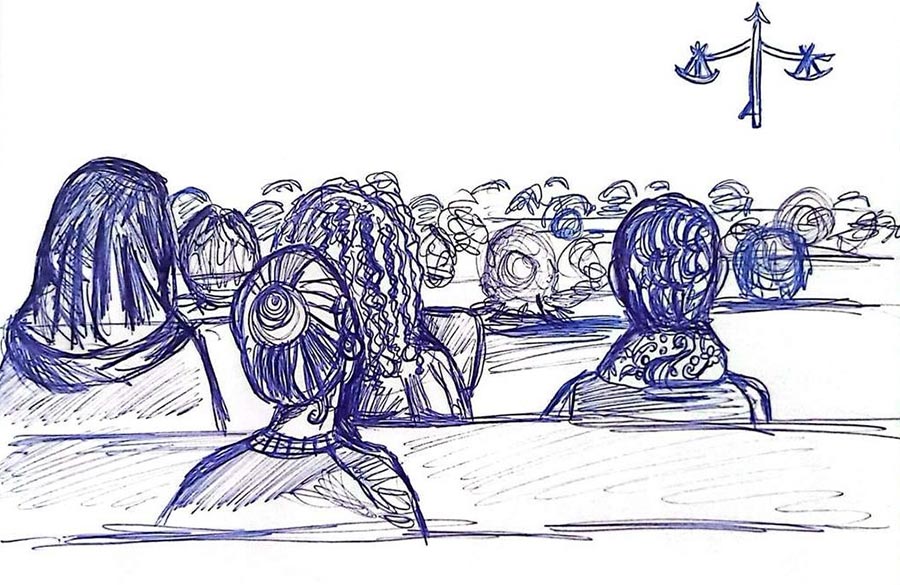
“Procedural tricks”
The defence raised a number of questions in four other QPCs. This was poorly received by the prosecution, which called it a “massive use of procedural tricks to delay criminal proceedings”. Deputy Public Prosecutor Olga Martin Belliard called these “delaying tactics”. She said there have been seven years of judicial investigations since the first interrogations and court appearances, so the parties have had seven years to raise any constitutional issues, but it was only in the last seven days that these seven QPCs were raised.
And so the first day of the hearing came to an end, marked by five long hours of monologues from both sides of the courtroom. The next day, after a detailed examination of all the QPCs from the previous day, the presiding judge dismissed them one by one with a wave of her hand. She also restored a certain balance of power by reprimanding one of the defendants who, hiding behind his co-defendants, discreetly took his phone from his pocket. “Mr. Jolibois, where do you think you are?” she said. “I’ve been watching you tapping away on your phone for the last few minutes! You will use pen and paper to take notes, like your co-defendants. It may help you to be more serious.” Discreet laughter could be heard in the courtroom as the businessman was brought back to his status as a defendant.
A bit of drama
The second day was devoted to examining 13 procedural irregularities cited by defence lawyers. This is significant. In more “ordinary” terrorism trials, it is usually State-appointed lawyers who provide the defence. In the Lafarge trial, it is lawyers from private firms who specialize in white-collar crime. They may have less detailed knowledge of anti-terrorism law than of financial and tax law, but with skill they meticulously analyse each stage of the proceedings to detect any irregularities. This strategy requires considerable resources. Aurelia Grignon, for example, raised inconsistencies in the period covered by the charges against Pescheux, former director of Lafarge’s Syrian subsidiary. She said there was lack of coherence between the indictment and the order referring the case to the criminal court, which extended this period by two months -- from July (when Pescheux left his post) to September 2014 -- for new charges of “advising his successor”.
The strategy paid off. At 8.15 p.m., after six hours of debate almost entirely monopolised by the defence, the presiding judge suspended the hearing. The judges came back after an hour of deliberation, and representatives of the associations exchanged worried glances. This rather short deliberation did not bode well for them. The presiding judge did indeed declare a procedural irregularity, suggesting that proceedings would be delayed. But she saved a final twist by asking the defendants to stand. “Not so fast, though. We’ll see you in two weeks,” she said. Join us in Room 2.01 on November 18 for the next instalment...
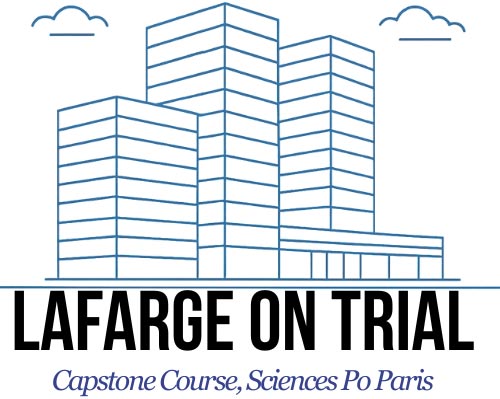
As part of the Capstone Course in International Law in Action, Professor Sharon Weill and eleven students at Sciences Po Paris, in partnership with Justice Info, are dedicated to weekly coverage of the Lafarge trial, conducting an ethnography of the proceedings. The members of this student group are Sofia Ackermann, Maria Araos Florez, Toscane Barraqué-Ciucci, Laïa Berthomieu, Emilia Ferrigno, Dominika Kapalova, Garret Lyne, Lou-Anne Magnin, Ines Peignien, Laura Alves Das Neves, and Lydia Jebakumar.


